Water in Summer
Weight★No★More℠ Diet Center
Summer and very hot weather are upon us, and I want to remind everyone of one very important function of water in your body: It regulates your body temperature!
Too many people don’t drink enough (or any!) water when they’re at the beach or pool or park. This a problem because heat stroke (when the body can no longer sweat to cool itself while the body temperature is rising) results from prolonged exposure to high temperatures, usually in combination with dehydration . . . which leads to failure of the body’s temperature control system. The medical definition of heat stroke is a core body temperature greater than 105 degrees. Sounds high, right? But it’s very easy for that to happen when summer temperatures are in the high 90’s and low 100’s.
Fainting may be the first sign of heat stroke. If you’re standing when you happen to faint and fall, obviously people will see and come to your assistance. But, if you were dehydrated before falling asleep on your beach chair or towel, and becoming more so while sleeping, your body temperature may become too high, and you’ll faint or suffer heat stroke while you’re asleep. Who’ll notice? People won’t realize how long you’ve been asleep until you’re already in trouble: Some of the other signs are uncontrolled muscle contractions, and muscle breakdown leading to the release of toxins in the blood which may cause cardiac arrhythmia and death. Believe it: People do die every year. Plus, if you fell asleep exposed to the sun, instead of under an umbrella, you will also suffer the consequences of a terrible, excruciating painful sun burn.
So, make water your drink of choice this summer. Lots of it. If you decide to take a nap, ask someone to wake you in an hour, and then drink water — and do the same for those you’re with, especially children and older adults. And while it might seem weird or make you feel a little funny, if you happen to see someone lying still in the sun (especially if they’re alone) for hours without moving, bring it to a lifeguard’s attention and have them wake that person. Or do it yourself. They’ll appreciate your concern, as you would if someone did that for you.



